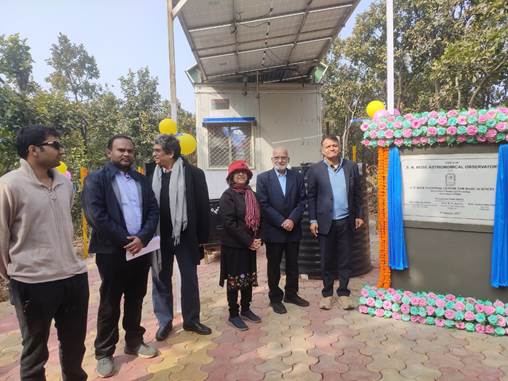New Panchet Observatory in West Bengal to Boost Astronomical Research and Education
Renowned astrophysicist and Vice Chancellor of Ashoka University emphasized the importance of longitudinal coverage for capturing fleeting celestial events, highlighting the observatory’s global significance.

- Country:
- India
The S.N. Bose Centre for Basic Sciences (SNBCBS), an autonomous institute under the Department of Science and Technology, has inaugurated a state-of-the-art astronomical observatory atop Panchet Hill in the Garpanchakot area of Purulia district, West Bengal. Positioned at an elevation of 600 meters and longitude of approximately 86° E, the facility is set to revolutionize observational astronomy in the region and fill a significant longitudinal gap in global astronomical research.
Strategic Importance of the Observatory
Globally, the 86° E longitude is sparsely populated with observatories. Stretching from the Arctic Ocean in the north to Antarctica in the south, this zone is critical for tracking transient astronomical phenomena, which can last from a few minutes to several hours. The Panchet Observatory is strategically positioned to contribute to this global observational network, enhancing the study of such transient events and fostering international collaborations.
Renowned astrophysicist and Vice Chancellor of Ashoka University emphasized the importance of longitudinal coverage for capturing fleeting celestial events, highlighting the observatory’s global significance.
Collaborative Efforts
The S.N. Bose Centre has partnered with Sidhu Kanu Birsa (SKB) University under a memorandum of understanding (MOU) to jointly manage the observatory. This collaboration aims to share resources, train students in telescope handling and data recording, and create an academic ecosystem in the region.
During the virtual inauguration at SKB University, Dr. Tanusri Saha-Dasgupta, Director of S.N. Bose Centre, expressed pride in this achievement, anticipating significant contributions to observational astronomy. She acknowledged the collaborative efforts of her team, emphasizing the observatory’s potential to generate national and international scientific partnerships.
Local Impact and Development
Speaking at the event, Shri Viswajit Sahay, Financial Adviser of the Department of Science and Technology, highlighted the transformative potential of such an observatory. "An observatory always creates its own ecosystem in its vicinity, and the Panchet Observatory is no exception," he stated.
Dr. Pabitra Kumar Chakrabarty, Vice Chancellor of SKB University, noted the importance of such a facility in Purulia, a region often perceived as underdeveloped. He expressed hope that the observatory would inspire local students to pursue careers in astronomy and related sciences.
Establishment and Technical Details
The observatory’s development was spearheaded by astrophysicists Dr. Ramkrishna Das, Dr. Soumen Mandal, and Dr. Tapas Baug of SNBCBS. Following land acquisition in 2018, the team worked on site characterization, assessing weather and astronomical ‘seeing’ conditions, and installing a 14-inch telescope capable of advanced scientific observations.
Future Aspirations
The observatory is expected to attract researchers and students from across the country and abroad, bolstering India’s presence in the global astronomical community. Additionally, its proximity to SKB University offers a unique opportunity for student engagement and academic growth, potentially making Purulia a hub for astronomical education and research.
The inauguration saw participation from several dignitaries, including Dr. B.N. Jagtap, Chairman of the Governing Body of SNBCBS, and Shri Vivek Pankaj, SDO of Raghunathpur, along with scientists from the SNBNCBS team.
With this initiative, the Panchet Observatory not only bridges a crucial gap in the global network of observatories but also opens new horizons for scientific exploration, education, and local development.
- READ MORE ON:
- S.N. Bose Centre for Basic Sciences










